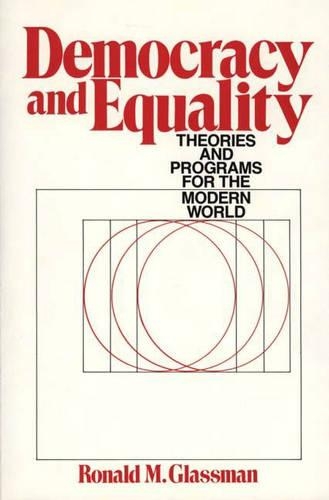
Democracy and Equality: Theories and Programs for the Modern World
(Hardback)
Publishing Details
Democracy and Equality: Theories and Programs for the Modern World
By (Author) Ronald Glassman
Bloomsbury Publishing PLC
Praeger Publishers Inc
4th April 1989
United States
Classifications
Tertiary Education
Non Fiction
305.0973
Physical Properties
Hardback
234
Description
While the romantic notions of social and economic equality once espoused by the socialist movement have been overshadowed by the realities of government power, bureaucractic inefficiency, and class divisions, Glassman claims that the quest for equality and social justice can and must be pursued within legal-democratic societies. He contends that the quest for equality within the democratic framework is politically, economically, morally, and socially beneficial. Using the theoretical principles of Aristotle, Rawls, and Keynes, Glassman demonstrates that the development of practical programs can allow an expansion of the middle class and a greater degree of equality within capitalist democratic societies. Along with these three non-socialist theories for equality, the book analyzes some contemporary democratic-socialist programs that have been developed for the same objective. All the proposed programs throughout this book emphatically establish democracy as an essential factor and then work toward achieving greater equality within the parameters set by the legal-democratic state. Democracy and Equality will prove invaluable to anyone interested in social theory, the principles of equality, and political and economic developement of the industrial state.
Reviews
"Democracy and Equality puts forward a powerful critique of conservative ideology and marshals a strong argument for the very American idea that to preserve democracy we must use democracy to prevent great extremes of poverty and wealth."-Jeff Faux, Economic Policy Institute
"Thoughtfully and brilliantly, Ron Glassman examines the historical and intellectual roots of our democratic tradition. While politicians too often confuse patriotism with pandering, Glassman performs the essential public service illuminating why equality and democracy are (a) not four letter words, and (b) the cornerstone of a better America."-Mark Green President of the Democracy Project, nominee for the U.S. Senate in New York, 1986
Expanding the structural theories of political economy of earlier studies, Glassman's critical interpretation of the sociological importance of capitalism for liberal democracy demarcates this from his previous works, mostly concerned with social theories of economics, and others like it, such as Raymond Murphy's Social Cloture (1988) and Ralf Dahrendorf's Essay's in the Theory of Society (1968). Glassman's Keynesian critique of conservative and socialist political economy which builds in the economic ideas of Aristotle, J.M. Keynes, and John Rawls, places him in the same tradition of political economy as Adolph Lowe, Robert Eisner, and J.K. Galbraith. Although the thesis that extreme inequalities of wealth threaten democracy is shared in critiques like Robert Dahl's Polyarchy, and Philip Green's Retrieving Democracy, Glassman's defense of equality is not concurrent with their critique of class theory. This ability to establish a realistic balance between the expression of economic and political forces that affect legal democracy makes the book's polemical, critical theoretical, and practical considerations a critique of the welfare state to be read alike by friends and foes of capitalism. Recommended for all scholars of contemporary political economics, American politics, political philosophy, and social theory.-Choice
"Expanding the structural theories of political economy of earlier studies, Glassman's critical interpretation of the sociological importance of capitalism for liberal democracy demarcates this from his previous works, mostly concerned with social theories of economics, and others like it, such as Raymond Murphy's Social Cloture (1988) and Ralf Dahrendorf's Essay's in the Theory of Society (1968). Glassman's Keynesian critique of conservative and socialist political economy which builds in the economic ideas of Aristotle, J.M. Keynes, and John Rawls, places him in the same tradition of political economy as Adolph Lowe, Robert Eisner, and J.K. Galbraith. Although the thesis that extreme inequalities of wealth threaten democracy is shared in critiques like Robert Dahl's Polyarchy, and Philip Green's Retrieving Democracy, Glassman's defense of equality is not concurrent with their critique of class theory. This ability to establish a realistic balance between the expression of economic and political forces that affect legal democracy makes the book's polemical, critical theoretical, and practical considerations a critique of the welfare state to be read alike by friends and foes of capitalism. Recommended for all scholars of contemporary political economics, American politics, political philosophy, and social theory."-Choice
Author Bio
RONALD M. GLASSMAN is currently executive director of New York City Americans for Democratic Action and has been actively involved in many political campaigns. He has written numerous volumes, including The Political History of Latin America, Democracy and Despotism in Primitive Societies, The New Middle Class and Democracy, and with Mark Green, A Democracy Agenda for the Year 2000.
